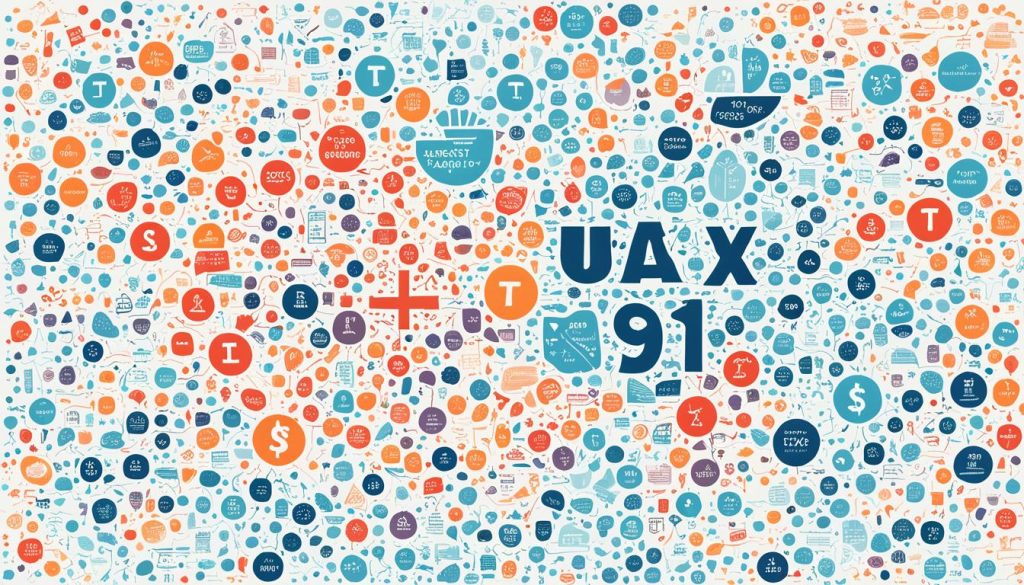Understanding UK tax for self-employed pros and freelancers can seem tough. It’s like walking through a maze with no guide. But, getting to grips with UK freelance tax rules is key. It stops trouble and fines. Whether you’re just starting or already freelancing, this guide shines light on freelance taxation guidance.
Knowing your tax duties keeps you safe from unexpected bills. It also helps you plan your money for the future. Our goal is to make tax management clear. We’ll show you what to expect and how to meet HMRC’s rules. Being up to date is how you navigate self-employed and freelance taxes in the UK smoothly.
Introduction to Tax Responsibilities for the Self-employed

When you start working for yourself in the UK, you meet a new set of self-employed tax obligations. Knowing what these are is vital for keeping your business healthy and following HMRC tax responsibilities. Let’s explore what you need to understand to manage taxes well as a sole trader.
Being self-employed gives you the freedom of being your own boss. Yet, it also introduces you to sole trader taxation rules. From the start, knowing about tax payments and possible tax deductions is key. This knowledge helps with your finances.
- Accurately calculating your income to ensure proper tax payments
- Consistently keeping up-to-date records to streamline the tax return process
- Understanding the various expenses that can be claimed to mitigate your tax liability
Keep these points in mind to stay in good standing with HMRC. Being informed and diligent with your self-employed tax obligations is essential. It’s needed for your financial success in self-employment.
Registering as Self-employed with HMRC
When you decide to work for yourself in the UK, registering with HMRC is a must. This step is crucial for being right with taxes and National Insurance. Despite seeming tough, this process is manageable with a bit of help.
Navigating the Registration Process
Registering with HMRC needs focus and the right details. Start by gathering your personal info, like your National Insurance number and business specifics. The HMRC site lists everything you need. Then, create a Government Gateway account to fill in the online form. Making sure to pick the right category for your work, such as sole trader or partnership, is key.
Understanding NI Contributions
- Class 2 contributions: A set amount paid each week by self-employed folks earning above a certain limit. This is important for future benefits and state pension eligibility.
- Class 4 contributions: These depend on how much you earn and are worked out yearly. They help you qualify for state benefits.
Knowing about NI contributions is vital. They are a big part of what you owe financially and affect your benefits later. The HMRC site explains these charges and the support they offer.
When and How to Register
Registering on time is crucial. Do it by 5th October in your second tax year to dodge fines. This lets you sort your NI payments and get ready for your first tax return. For easier registration, use the online method, though there’s a postal option as well.
In summary, getting through the registration with HMRC is key for self-employed success in the UK. Tackling the registration head-on, plus understanding NI contributions, lays a solid foundation. This ensures you’re all set financially as you grow your own business.
Distinguishing Between Self-employed and Freelance Work

In the UK’s diverse working economy, it’s key to understand the difference between self-employed and freelance. This particularly matters for tax reasons.
Though many mix up the terms, they mean different things. This affects how people run their business and handle taxes. More people now choose to shape their careers by freelancing in the UK. It’s vital to know what each term means.
Being self-employed usually means running your own business alone or with a partner. Freelancers, who are also self-employed, typically work on several projects for various clients. They often work in creative or professional areas.
- Tax Documentation: Self-employed people face more tax tasks due to potentially having varied income sources. Freelancers usually have simpler tax matters, focusing on earnings from different projects.
- Business Structure: Freelancers might work more flexibly, while self-employed people often have more fixed ways of working. This could include hiring staff or keeping a steady list of clients.
- Tax Deductions: Depending on their expenses and investments, self-employed and freelancers may have different tax deduction options.
The self-employed vs freelance difference is not just about words; it affects tax management and understanding of possible deductions. Freelancers in the UK need to keep up-to-date to handle taxes well. This helps them make the most of their income and stay on the right side of HMRC rules.
Getting personalised tax advice is wise. It helps work out your exact status. This advice can improve your financial choices and dealings with the UK tax system. Whether you’re self-employed or freelancing, having the right information is crucial for success in independent work.
Self-employed and freelance tax in the UK
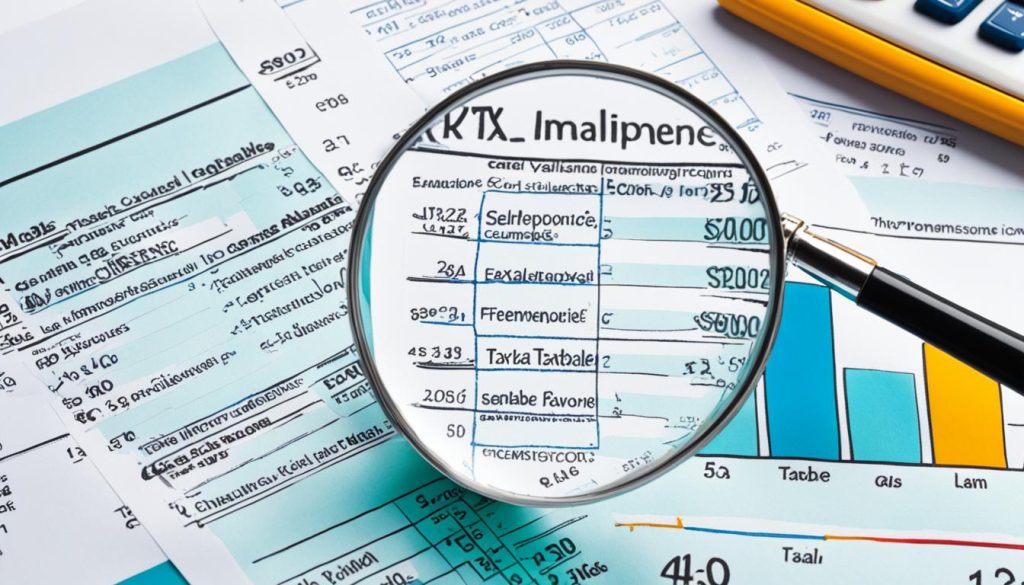
If you’re self-employed or freelancing, knowing how to handle your taxes is key. We’ll cover calculating your income, spotting tax-deductible expenses, and keeping up with deadlines. This knowledge will help you handle your taxes well and understand UK tax laws.
Determining Taxable Income
First, know the difference between personal earnings and business profits. Your business’s total revenue isn’t all taxable. You get allowances and deductions. These can lower what you owe to HM Revenue and Customs (HMRC).
Expenses and Allowances
For freelancers, knowing which costs are tax-deductible is essential. Costs like travel, office supplies, and equipment for your job can reduce your tax bill. Also, certain allowances can help lower it even more. Keep track of all business costs over the year, so you don’t miss any deductions.
Key Dates and Deadlines
Being on top of your tax deadlines is crucial. It helps with both following the rules and planning your finances. Remember, the important dates are January 31st for self-assessment tax returns and both July 31st and January 31st for payments on account. Avoid penalties by not missing these dates. Knowing how to pay can also make managing your money easier.
- Keep accurate records of all business transactions.
- Deduct eligible expenses to lower your taxable income.
- Utilise allowances and reliefs available to the self-employed.
- Always prepare for the tax deadlines well in advance.
By considering these points, self-employed individuals and freelancers can keep focused on growing their business. Always check the latest from HMRC to avoid fines or legal issues. Tax rules change, so stay informed.
Calculating Your Income Tax Liability
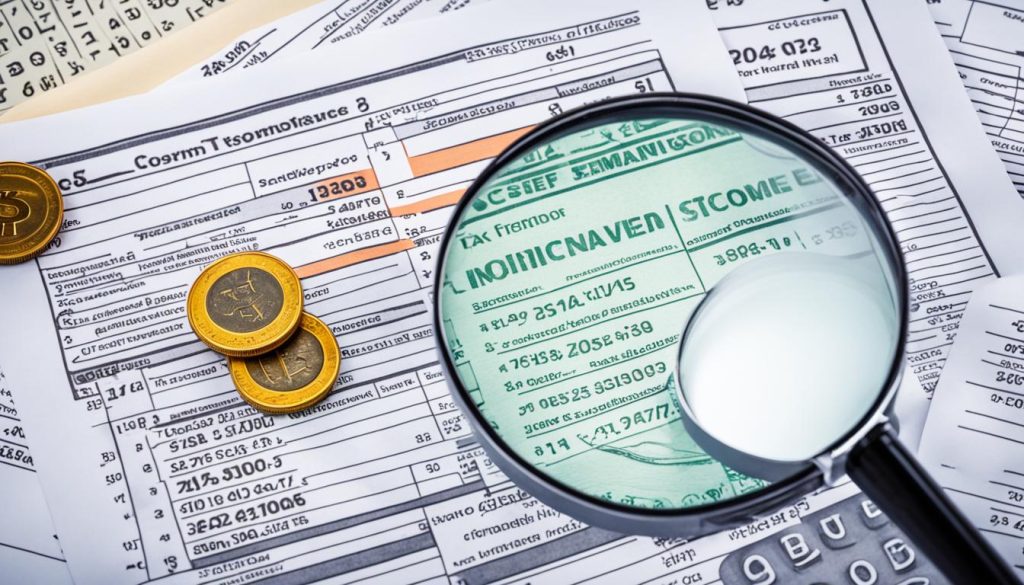
Finding your way through income tax calculations is key if you earn from freelance work or self-employment. The end of the financial year can bring both hope and worry. To stay calm, you need to get your tax details right. Let’s look at how you can figure out what you must pay in taxes.
Figuring out your taxes isn’t as hard as it seems. Start with figuring out your taxable income. This means adding up what you’ve earned from freelance or self-employed work and subtracting allowed costs. Keeping accurate records all year makes this easier.
- Gather all work-related financial documents, like invoices and receipts.
- Subtract allowed expenses to find your net income.
- Use the current tax rates to find out how much tax you owe on your net income.
- Don’t forget to include all types of income, such as interest from savings, in your total tax calculation.
Handling freelance taxes can sometimes need extra care. If your earnings come from various sources, it’s critical to separate them clearly. Being thorough in your tax checks can prevent any mistakes that might lead to an audit or penalties from HMRC.
- Use HMRC’s online tax calculators to make the process easier.
- Keep up with yearly changes in tax laws and rates, as they can impact what you owe.
- Make time to go over your tax calculations carefully. Make sure you’ve included all the tax reliefs and allowances you qualify for.
By following these tips, you can take control of your taxes. This leaves you more time to grow your freelance or self-employment business. If you’re ever unsure, getting advice from an accountant can clear up any confusion. This ensures you meet your tax duties correctly and efficiently.
Understanding and Applying for Tax Reliefs

Taxation for the self-employed can seem daunting. But, learning about tax reliefs for self-employed can save lots of money. Freelancers and sole traders have special reliefs and allowances. They help you keep more earnings and pay less tax. This section will guide you through using the annual investment allowance and finding claimable self-employed expenses.
Tax Reliefs Available to the Self-employed
If you’re self-employed, many tax reliefs can reduce your financial stress during tax time. These reliefs help small businesses and freelancers. They also promote growth in the UK. It’s key to explore all options to avoid overpaying on tax.
Utilizing the Annual Investment Allowance
The Annual Investment Allowance (AIA) is a great tax relief. It lets the self-employed subtract the cost of qualifying items from their profits before tax. This includes things like office furniture to big machinery if they’re for business. Knowing about the AIA can lead to big savings for businesses investing in growth.
Claiming Expenses: What’s Eligible?
- Office supplies and equipment
- Business travel and accommodation
- Marketing and advertising costs
- Legal and financial services
- Training courses related to your business
Recording all expenses is essential for the self-employed. These records are key for tax deductions. Knowing what counts as a claimable self-employed expense lowers your tax. It also helps with financial planning.
Using these tax reliefs and allowances can improve your business’s financial health. Always get advice from a pro or check HMRC’s guidance on these reliefs and expenses.
National Insurance: A Comprehensive Guide

Understanding National Insurance for self-employed people requires knowing about different contribution types and their benefits. It’s key for achieving financial independence. These National Insurance classes create a solid foundation for future security. Let’s explore the details that define our fiscal responsibilities and the advantages they bring for those who work for themselves.
Classes of National Insurance for the Self-employed
For self-employed workers in the UK, Class 2 and Class 4 National Insurance contributions are essential. Class 2 contributions are at a flat rate and unlock certain state benefits. Class 4 contributions change based on how much you earn, adjusting to how successful you are each tax year.
Voluntary Class 2 Payments
If you earn below a certain amount, you can choose to pay Class 2 National Insurance voluntarily. This choice can keep you covered for state pension and maternity allowance, avoiding any breaks in access to benefits.
Calculating Class 4 Contributions
- Find out how much you’ve earned: Start by figuring out your yearly profits.
- Check if you pass the lower threshold: You pay Class 4 contributions only on earnings above this limit.
- Use the right rates: You’ll pay a percentage on profits that fall between two thresholds.
- Look out for changes: Government reviews might change how much you need to pay.
It’s important to see these contributions from two angles: They’re not just taxes, but investments in your future security. The money you put into National Insurance today helps support you or your dependents later, showing why it’s crucial for self-employed people in the UK to understand this system.
VAT: Should You Be Registered?
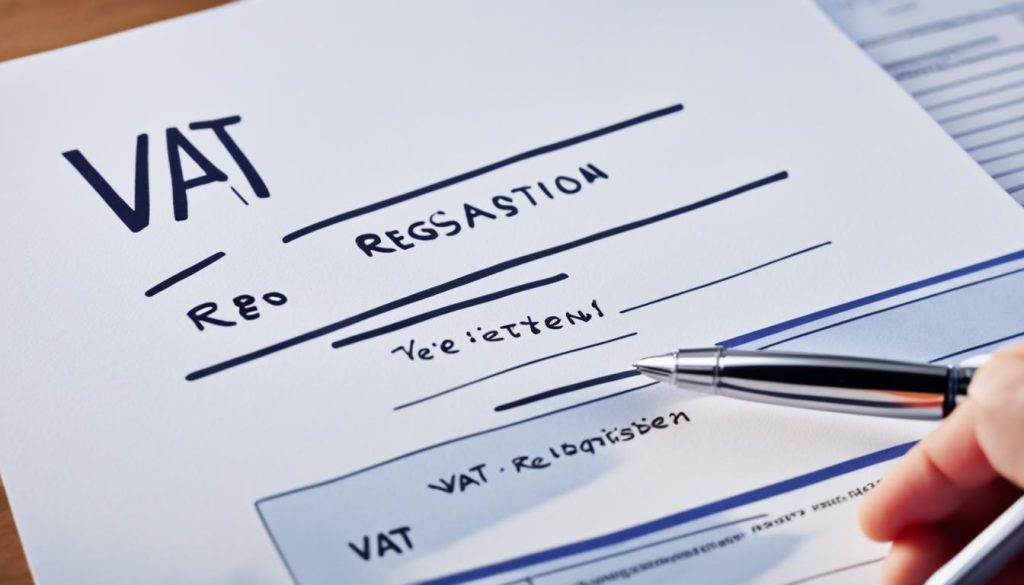
Figuring out VAT registration is key for self-employed people or freelancers in the UK. Knowing about the VAT threshold can help you follow HMRC rules. It also lets you make smart choices for your business. Should you register for VAT? Let’s look at how this choice could affect your money matters.
Registering for VAT has pros and cons. It might make you look more professional and allows you to get back VAT on business costs. But, it also means watching your sales closely and dealing with more paperwork. Deciding to join the VAT system, whether because you have to or want to, is important.
- Assess Your Turnover: You must sign up for VAT if your sales go over the VAT limit. Always track your earnings to know when you pass this limit.
- Consider Voluntary Registration: Even with lower sales, signing up on purpose could have perks. Think about if getting back VAT on what you buy could balance out the extra work.
- Understand the VAT Flat Rate Scheme: There’s a simpler scheme for small businesses. It can save you time and maybe lower your VAT payments.
- Keep Accurate Records: Keeping good records is crucial when you’re VAT-registered. You must report all VAT you charge and pay correctly.
- Impact on Invoicing: Being VAT-registered means changing your prices to add VAT and giving proper invoices to your customers. This could impact how competitive you are, especially if most of your clients don’t pay VAT.
Getting advice on VAT when you’re self-employed is very important for your business. Think about talking to a tax expert. They can give you advice that fits your specific financial and business situation.
Completing the Self Assessment Tax Return

The tax year is ending, so we must focus on the Self Assessment tax return. This is key for freelancers and self-employed people in the UK. A careful process helps avoid mistakes when dealing with HMRC. This part highlights the need to accurately complete the tax return to dodge issues that bring extra checks or fines.
Gathering the Necessary Documentation
Starting your Self Assessment tax return means getting all your tax paperwork in order. You should gather proofs of income, expenses, and any claimed reliefs or allowances. You’ll need a comprehensive list of:
- All invoices from the tax year
- Bank statements showing relevant transactions
- Details of all business expenses
- Any capital gains or extra income
Filling Out the Form Online
With your internet ready and documents by your side, you can start the online tax form on the HMRC site. You need an account to begin, but after that, it’s easier to do every year. Here are the main parts you’ll fill out:
- Personal information
- Income and dividends from your work or business
- Allowable expense deductions
- Pension and charity contributions
- Calculating your tax due or refund
Avoiding Common Errors
Mistakes can cost you not just money, but also time and stress in fixing them with HMRC. Here’s how to avoid common errors:
- Check your figures carefully to avoid mistakes
- Make sure you claim the right expenses as per HMRC rules
- Don’t forget to claim reliefs that apply to you
- Double-check your submission details before sending
To sum up, being thorough with your Self Assessment tax return preparation, and keeping close track of your documentation, makes the submission process smoother. It also shows you’re a diligent freelancer in the UK’s freelance community.
Paying Your Tax Bill: Options and Advice
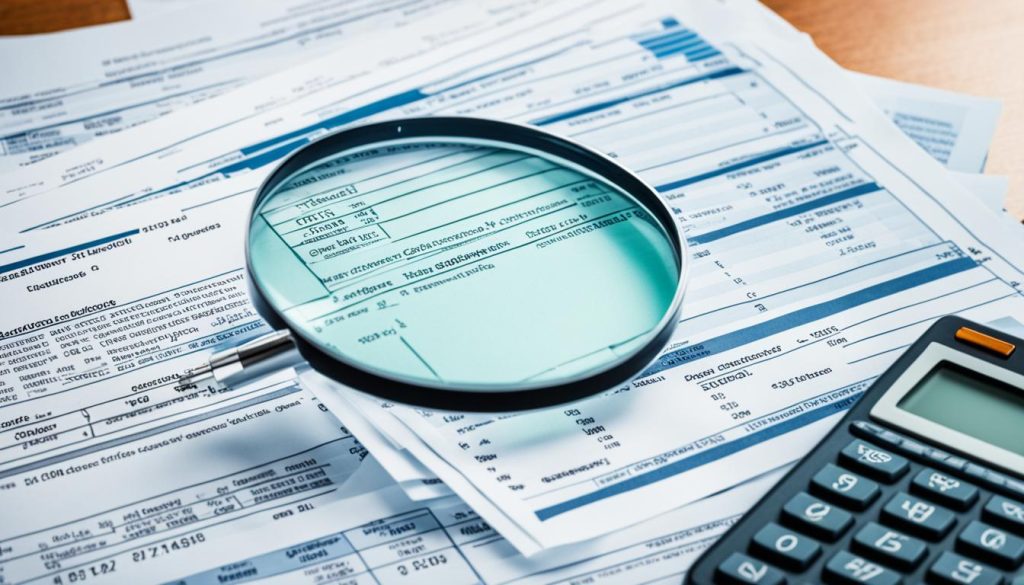
As the tax year ends, self-employed people and freelancers must settle their tax bills. It’s crucial to know the tax payment options available. This, along with good self-employed tax advice, makes the process smoother.
-
Direct Debit payments make it easy to meet deadlines without mistakes, avoiding penalties.
-
If your income changes often, the Budget Payment Plan lets you make regular, smaller payments. This way, you can manage your tax bill better.
Financial difficulties might prevent paying your tax all at once. In these cases, HMRC payment plans are very helpful. They allow you to pay your tax bill over several months, reducing stress on your finances.
-
Look at your finances carefully. If needed, get in touch with HMRC quickly to talk about a payment plan.
-
Make sure you know the agreement terms, including any interest or penalties for this choice.
Getting ready for tax payments is vital. Viewing each payment as part of your financial strategy is important. Tax experts can guide you through planning, like saving a part of your income for taxes in a separate account.
Being informed and ready is essential for handling your taxes as a self-employed person. The goal is to stick to tax laws while keeping your business financially healthy.
Tax Strategies for the Self-employed
Being self-employed means you can tackle tax season smoothly with the right approach. You can even cut down what you owe. We’ll look into essential tax tips to secure a brighter financial standing.
Year-End Tax Planning
Good tax planning is key for solo workers. It’s about looking at your income and spending wisely before the year ends. By delaying income, buying things your business needs, and using all allowances, you can lower your tax bill.
Investing in Pensions
Paying into pensions is smart for two reasons. It not only prepares you for retirement but also cuts your tax bill. This move can sincerely lessen how much tax you pay while growing your nest egg.
Seeking Professional Tax Advice
Sometimes, taxes can get too tricky on your own. This is when a tax pro’s insight becomes invaluable. They offer advice just for you, unveiling ways to save on taxes and avoid overpaying.
- Discussing your finances with an advisor to find tax breaks
- Making smart deals that are kind to your taxes
- Being ready for tax law shifts and how they affect you
By combining end-of-year checks, setting money aside for retirement, and getting expert advice, freelancers can craft a strong tax plan. This plan will fit both their work life and financial aims.
Understanding IR35 and Its Implications
IR35 legislation greatly influences freelance contractors in the UK, affecting how they are taxed when working through personal limited companies. It’s vital to know if you’re inside or outside IR35. This knowledge affects your taxes and National Insurance.
IR35 aims to stop ‘disguised employment’, where people work like employees but through another company. It makes sure taxes are properly paid by these workers and their clients. If you’re inside IR35, for tax purposes, you’re seen as an employee without being on the company’s payroll.
- Know your employment status: Being ‘inside IR35’ relies on control, substitution, and mutually agreed obligations.
- Tax implications: Inside IR35 means you might pay more tax, treating your income as a salary.
- Your client’s role: Nowadays, if your client is fairly big, they have to decide your IR35 status.
It’s crucial for freelancers to understand IR35 to avoid hefty fines and back taxes. For best practices, consulting with an IR35-experienced tax advisor is advisable. They can help you stay compliant and financially optimised.
- Review your contracts: Getting professional advice is key to knowing your IR35 status.
- Look at your business structure: Depending on IR35, operating as a sole trader or another entity might work better.
- Keep updated: Stay on top of any changes in IR35 to safeguard your interests.
Complying with IR35 is essential for UK freelancers. Understanding it helps manage tax duties, plan finances, and stay within legal boundaries. Always stay proactive and well-informed. This lets freelancers make smart decisions for their business future.
Conclusion
We are wrapping up this guide with a strong reminder for UK freelancers and self-employed individuals. It’s crucial to know the tax rules that apply to your work. Understanding UK tax will help you follow the law and make smart financial choices. This article has laid out key tax rules and chances, from knowing what you owe in income tax to dealing with VAT.
The sections before this have covered a lot about UK tax for freelancers. We’ve explained important points like National Insurance, tax reliefs, and important deadlines. Having a tax checklist is key for staying organised. This should include signing up with HMRC, working out your taxable income, keeping up with deadlines, and using tax breaks correctly.
Handling your taxes carefully is a must-do at all times. It’s also vital to keep up with tax law changes. We suggest looking back at this advice often and getting expert advice when needed. This way, self-employed people and freelancers can improve their finance skills. Such efforts will help your work and business spirit grow in the UK’s economy.

